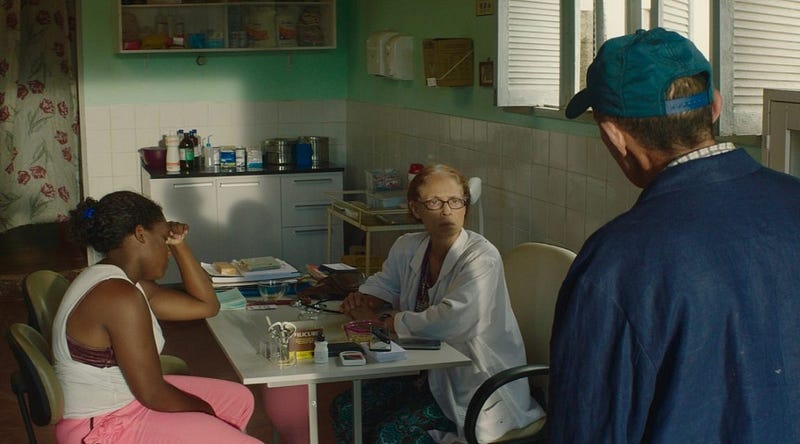An immersion in the tradition and travails of a Brazillian village from Juliano Dornelles and Kleber Mendonça Filho

Inequality has permeated our social consciousness like never before of late. The last few years, features such as Parasite and Knives Out, have mined class structure and unequal distribution of wealth to expert effect. Bacurau, the latest feature from Brazillian filmmakers Juliano Dornelles and Kleber Mendonça Filho, nestles nicely alongside these, planting a Brazillian village in the middle of a genre piece, as capitalism, corruption, and shadows of colonialism return to excise more harm on their community.
Synopsis
A few years from now… Bacurau, a small village in the Brazilian sertão, mourns the loss of its matriarch, Carmelita, who lived to be 94. Days later, its inhabitants (among them Sônia Braga, Aquarius) notice that their village has literally vanished from online maps and a UFO-shaped drone is seen flying overhead. There are forces that want to expel them from their homes, and soon, in a genre-bending twist, a band of armed mercenaries led by Udo Kier (Blade) arrive in town picking off the inhabitants one by one. A fierce confrontation takes place when the townspeople turn the tables on the villainous outsiders, banding together by any means necessary to protect and maintain their remote community. The mercenaries just may have met their match in the fed-up, resourceful denizens of little Bacurau.

The synopsis offers up something of a mystery, a facet of the film enhanced by a leisurely introduction to this place and its peoples allowing your mind to speculate while you also take in the atmosphere of this Brazilian Frontier. You feel the quirks and charms of this village, its architecture, and the beautiful vistas that surround it. Watching a ceremonial drugtaking, community dances, a local DJ working as a town crier, or the obvious pride in their local museum, all add authenticity and texture. Its a “warts and all” portrait of a Brazilian community, one experiencing hardship from standing on the periphery of longstanding violence that plagues Brazil, political corruption (shades of and at Bolsonaro), and a corporation seizing control of local water resources. Enter a new threat, a hunting party of Westerners, led by the chilling Michael (Udo Kier), who are looking to satiate their bloodthirst by preying on the inhabitants of this isolated village. It’s a tilt into a genre exercise that is not glorified, instead used to deepen social commentary and historical context.
At times Bacurau is reminiscent of a documentary, an approach that feeds authenticity, and aids the films efforts to keep one foot in the past, while dipping the other across other types of cinema, notably westerns and revenge generes. The cast exude a genuine quality, a lived in feel that works into this interweaving of a troubled past, and the complexities and danger of the present. The village feels more like a holdout against the encroachment of modernization, one that clings to tradition, independence, and is determined to wear the stains of battle with pride, something nicely worked into the cleanup come the film’s resolution. The most overt component as you may expect, are these interlopers. Their racially rooted disregard for (some) human life, speaking to their priveledge and callous self-interest. It’s all a case of history repeating, as despite the end to empires, we have seen the rise of corporations and billionaires who continue to serve their own agendas at the expense of minorities and the impoverished.
The film is beautifully composed, the authenticity of the region being showcased thanks to some vivid cinematography by Pedro Sotero. Slow even leisurely sojourns through certain scenes, others imbued with a more harsh urgency. A tonal changeup met by an eclectic score from Mateus Alves and Tomaz Alves Souza, where authentic Brazillian music is interspersed with more electronic melodies. Some elements feel an ill fit, namely the clunky drone/hunter tech, whilst the lengthy setup may be polarizing to some viewers. Despite this, Bacurau is a refreshing and considered riff on the ‘siege film’. What often becomes a gleeful exercise of genre cinema is given weight, as a sobriety persists through the final act unfolds that reinforces the story. Bacurau is a tale told with a quiet fury that leaves a marked impression.

The Package
The Bacurau on screen showcases vivid, vibrant representation of the region, one that shines on Blu-ray. Deep blacks, bright colors, depth and detail are superb. Extra features also impress:
- Bacurau on the Map, a making-of documentary by Kleber Mendonça Filho: Running about an hour, its a very well put together dive behind the scenes of the film, working in aspects of the location, cast and crew, and overall production
- Audio commentary with Kleber Mendonça Filho: A rather leisurely commentary, but one that offers some nice insights into the cultural aspects of the film, from tradition to symbology, that are woven throughout
- Deleted Scene: One omitted scene that just gives you a little more time with some of the core characters
- Kleber Mendonça Filho, Juliano Dornelles and Sonia Braga in conversation (courtesy of Film at Lincoln Center):
- Booklet essay by film critic Fabio Andrade: Contained in the liner booklet
- New interview with Kleber Mendonça Filho and Juliano Dornelles: Under 10 minutes in length, a decent enough discussion of the film and its impact
- Mens sana in corpore sano (2011, a short film by Juliano Dornelles): Well worth your time!
- Theatrical trailer:

The Bottom Line
Bacurau is an immersion in the tradition and travails of a Brazilian village, one lying in the shadow of corruption, capitalism, and colonialism. Juliano Dornelles and Kleber Mendonça Filho excel in rooting the film in a bloody and haunting past, and the consequences of colonialism, as it once was, and how it now manifests in current day. A distinct work that blends beauty and brutality, that is deserving of your attention.

Bacurau is available via Kino Lorber from July 14th


